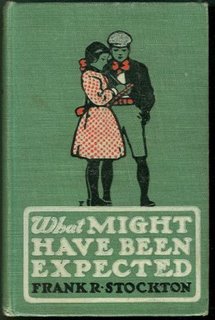Time and chance happen to them all
Courtesy of the good folk at the Usenet group rec.puzzles...
You are asked to choose one of three closed doors, behind one of which there is a prize. The other two doors hide goats. Once you have made your selection, I will open one of the remaining doors, demonstrating that it does not contain the prize. I will then ask you if you'd like to swap to the other unopened door, or stay with your first choice. Does it matter if you switch?
Bear this in mind...
a) I know where the prize is
b) After you have picked one, I will always show you one of the other doors which bears goat
c) I will always offer a switch, regardless of whether you have picked the prize or a goat.
Answer
The probability that you win when you switch equals the a-priori probability that you guessed incorrectly in the first place: 2/3.
In other words...
The person who always stays put wins only if his initial choice is correct, which has a probability of 1/3.
The person who always swaps wins only if his initial choice is incorrect, which has a probability of 2/3.
And again...
Imagine that instead of three doors you'd started with one million, one with a prize and the rest with goats. You select a door, and your odds of getting the prize are 1 in a million. The chances are 999999/1000000 that the prize is behind one of the other doors.
Now I open 999998 of the other doors and show you goats every time. Remember, the odds are 999999/1000000 that the prize is behind one of those doors, and I have eliminated 999998 of them for you.
Your chosen door still has a 1/1000000 chance of bearing the prize, and all the rest of the probability has now been concentrated in the one remaining door. Would you switch?
http://www.grand-illusions.com/simulator/montysim.htm
http://math.ucr.edu/~jdp/Monty_Hall/Monty_Hall.html

You are asked to choose one of three closed doors, behind one of which there is a prize. The other two doors hide goats. Once you have made your selection, I will open one of the remaining doors, demonstrating that it does not contain the prize. I will then ask you if you'd like to swap to the other unopened door, or stay with your first choice. Does it matter if you switch?
Bear this in mind...
a) I know where the prize is
b) After you have picked one, I will always show you one of the other doors which bears goat
c) I will always offer a switch, regardless of whether you have picked the prize or a goat.
Answer
The probability that you win when you switch equals the a-priori probability that you guessed incorrectly in the first place: 2/3.
In other words...
The person who always stays put wins only if his initial choice is correct, which has a probability of 1/3.
The person who always swaps wins only if his initial choice is incorrect, which has a probability of 2/3.
And again...
Imagine that instead of three doors you'd started with one million, one with a prize and the rest with goats. You select a door, and your odds of getting the prize are 1 in a million. The chances are 999999/1000000 that the prize is behind one of the other doors.
Now I open 999998 of the other doors and show you goats every time. Remember, the odds are 999999/1000000 that the prize is behind one of those doors, and I have eliminated 999998 of them for you.
Your chosen door still has a 1/1000000 chance of bearing the prize, and all the rest of the probability has now been concentrated in the one remaining door. Would you switch?
http://www.grand-illusions.com/simulator/montysim.htm
http://math.ucr.edu/~jdp/Monty_Hall/Monty_Hall.html



0 Comments:
Post a Comment
<< Home